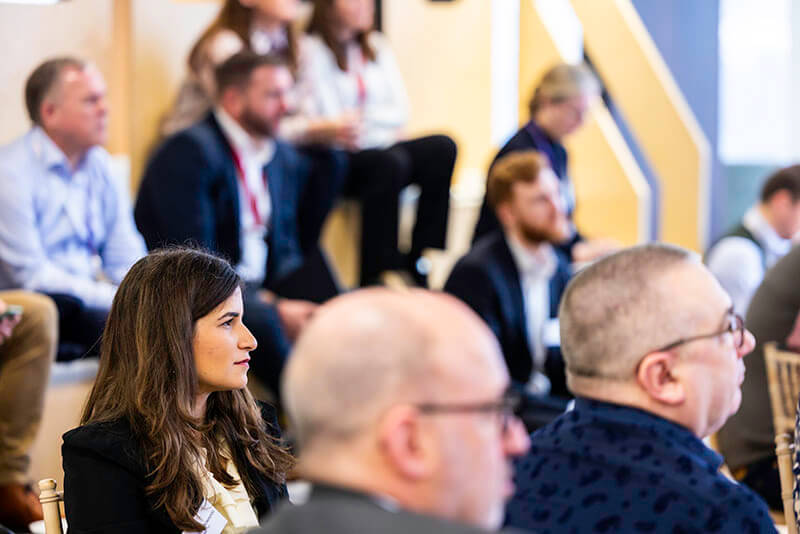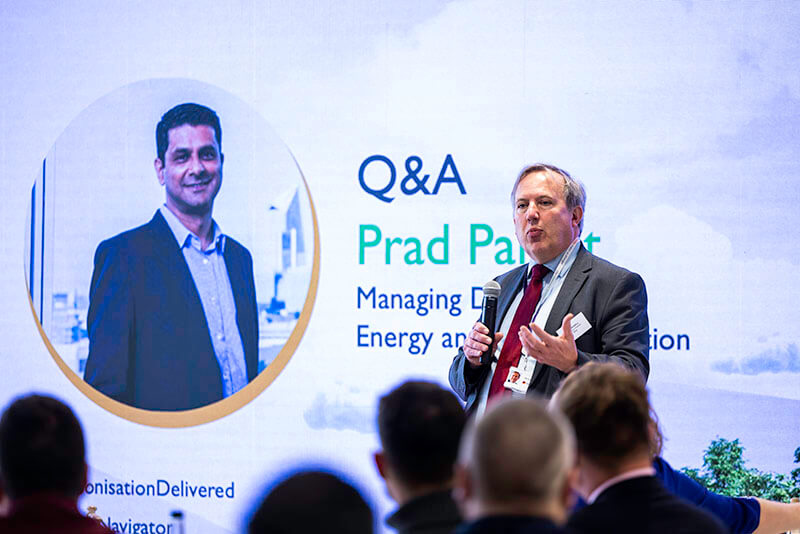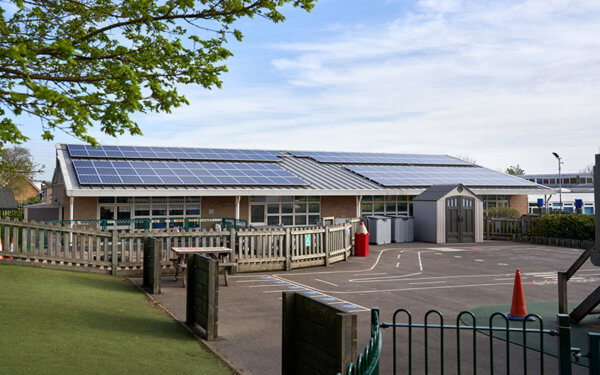Four important lessons on the road to decarbonisation
Accelerating decarbonisation plans was the hot topic when representatives from the public and private sectors met with sustainability experts at our breakfast briefing.
How can organisations successfully navigate the path to net zero?
This question, and more, were tackled at a lively forum on getting ‘Decarbonisation, Delivered’, which drew a capacity audience to Mitie’s headquarters in the Shard in February.
To build on the momentum of the Net Zero Navigator, the event brought together leading industry figures, public and private sector clients, and Mitie’s in-house experts, to discuss the way forward for net zero.
And in his keynote speech, Managing Partner at EP Group, Dr Steven Fawkes, explored four key lessons on the road to a more sustainable future, summarised below.
We are entering the era of the energy ‘prosumer’

One of the UK’s first steps on the journey to decarbonisation began back in 1991, with the opening of the first onshore wind farm. Powered by 400kWh wind turbines, it presented a viable clean alternative to fossil fuels.
Although a modest power output by today’s standards, the facility helped to usher in a sea change in sustainable innovation and the reliable supply of affordable, renewable energy.
Dr Fawkes explained that we are now entering phase two of this journey, which focuses on rising demand for renewable energy, self-generation, and distributed energy models.
“Phase two is turning us into what Alvin Toffler, a famous futurist, called ‘prosumers’,” said Dr Fawkes. “More than ever, people are both consuming and generating energy using technology such as solar panels. We are also seeing industry convergence as companies combine technologies to meet rising demand for renewable energy.”
But what does this mean for our built environments? As more people become prosumers and financial subsidies encourage convergence, the cost of renewable energy falls – and so do the means to generate it.
Dr Fawkes said: “Every asset in your buildings – from boilers and heat pumps to individual lightbulbs – can become a distributed energy resource to provide energy to the consumer and the grid.”
“But right now, we need to become more responsible in how we enable the efficient consumption of energy, and change the mindset of consumers,” he added.
With power comes responsibility

Typically, energy users have a passive mindset. You flip a switch, turn a tap, or light a gas flame and the energy you need is there. And people tend to assume it’s somebody else’s responsibility to improve sustainability.
That’s why, to accelerate decarbonisation, we must take responsibility and deliver a more efficient and sustainable energy system.
“There is a huge opportunity to better manage energy efficiency,” said Dr Fawkes. “The majority of condensing gas boilers in the UK are set at high flow but aren’t condensing, and if you turn the flow temperature down, there’s no reduction in comfort but you save six percent on gas.”
“Look at schools, too – so many still get heated over the weekend. I thought that had stopped with the use of timers, but it hasn’t. These are easy measures we can take when building, designing and managing facilities to save energy in the long-term,” he added.
When designing and constructing the buildings we occupy, many decision-makers are under pressure to complete projects as quickly as possible, and have little time to think about improving energy efficiency. This often means taking the path of least resistance, such as opting for the same solutions from the same suppliers.
“There are groups out there helping to change this mentality, including multilateral banks,” said Dr Fawkes. “We work with the Energy Efficiency Financial Institutions Group, who encourage financial institutions to put energy efficiency first. For example, when asked to finance a building or plant, they will always ask how energy efficient it will be. And the more we normalise this behaviour, the faster we can decarbonise.”
Confront the thorny issue of biodiversity and decarbonisation
Beyond the economic benefits achieved through self-generation, Dr Fawkes explained that you must not forget your responsibility to ESG – even when designing and building renewable energy plants and facilities.
“Phase two requires us to think about all impacts of energy use. Say you’re building a photovoltaic (PV) plant to generate clean energy, that’s great until you consider how your monolithic structure will impact open land and biodiversity,” he said.
As people become more aware of the potential fallout from dwindling biodiversity, the more pressure there will be on private and public organisations to take responsibility when building or expanding their sites and facilities.
“The threat to biodiversity could be a bigger problem than climate change,” said Dr Fawkes. “Humans can deal with higher temperatures, but if we kill off all the bees and there’s nothing left to pollinate plants – then we’re all stuffed. So, if you’re building a PV plant, you can’t afford the hypocrisy of ignoring its impact on biodiversity.”
Money makes a greener world go round
Building an environmentally sensitive plant or facility can dramatically increase its value compared to one with a higher carbon footprint or disruptive presence as more investors focus their capital into sustainable alternatives.
“Investors are under pressure from the likes of the Task Force on Climate-Related Financial Disclosure (TCFD) and the Sustainable Finance Disclosure Regulation (SFDR),” said Dr Fawkes. “And that pressure impacts their investments. Many want to deploy capital into sustainable projects. And that’s a good thing, because money talks, and when money says it wants to do something, it tends to happen.”
The scaling up of renewable energy supply has had a big impact on energy costs, with renewables becoming the cheapest source of energy in many markets. And while there is still some resistance from established energy generators, economics will take precedence. But the shift to a more flexible, converged, and prosumer model, driven by consumption of energy from the grid and the production of energy on-site, won’t happen overnight.
“These new models will help make low-cost institutional capital more accessible, even if you’re just building an individual self-generation plant as part of a larger portfolio,” said Dr Fawkes. “The future of energy supply and demand is localised and self-generating, and if our progress so far is anything to go by, it’ll be here before we know it.”
Watch these insights to spark your energy strategy
Complete the form below to access Dr Steven Fawkes’ keynote speech from our Decarbonisation, Delivered breakfast briefing.
Read next
FM’s role is key to delivering decarbonisation
With 60% of the UK’s large organisations now signed up to reach net zero, the race is most definitely on to adopt credible strategies and demonstrate progress on reducing emissions. However, the path is…

Top decarbonisation grants and funding schemes for UK organisations
The uncertainty over carbon emission reduction targets overshadowed COP27, but the clock continues to tick, so reaching net zero should be a top priority for organisations. The upfront costs for decarbonisation initiatives can be…
Mitie’s net zero experts share decarbonisation predictions and advice for the year ahead
Mitie, the UK’s leading facilities management company, has today published its latest decarbonisation insights paper: Net Zero Navigator 2023. Throughout the paper, Mitie’s decarbonisation experts share their predictions for the year ahead, covering a…